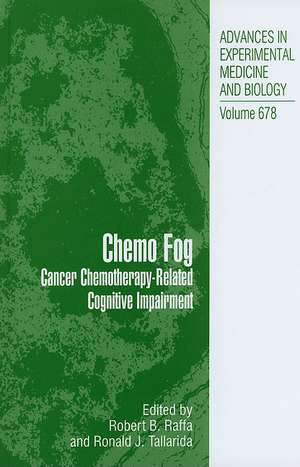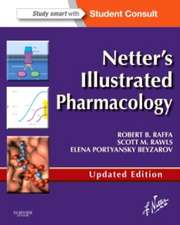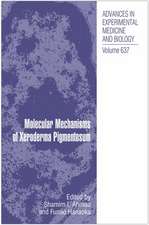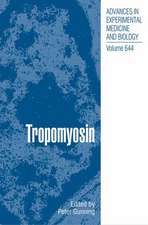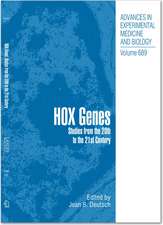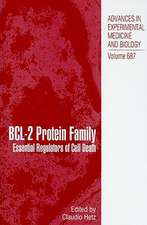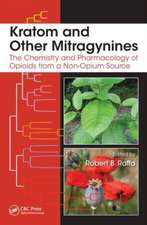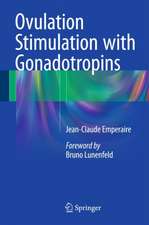Chemo Fog: Cancer Chemotherapy-Related Cognitive Impairment: Advances in Experimental Medicine and Biology, cartea 678
Editat de Robert B. Raffa, Ronald J. Tallaridaen Limba Engleză Hardback – 10 iun 2010
| Toate formatele și edițiile | Preț | Express |
|---|---|---|
| Paperback (1) | 1094.44 lei 6-8 săpt. | |
| Springer – 23 aug 2016 | 1094.44 lei 6-8 săpt. | |
| Hardback (1) | 1099.20 lei 3-5 săpt. | |
| Springer – 10 iun 2010 | 1099.20 lei 3-5 săpt. |
Din seria Advances in Experimental Medicine and Biology
- 9%
 Preț: 719.60 lei
Preț: 719.60 lei - 20%
 Preț: 691.93 lei
Preț: 691.93 lei - 5%
 Preț: 717.00 lei
Preț: 717.00 lei - 5%
 Preț: 716.28 lei
Preț: 716.28 lei - 5%
 Preț: 717.20 lei
Preț: 717.20 lei - 15%
 Preț: 640.24 lei
Preț: 640.24 lei - 5%
 Preț: 1113.83 lei
Preț: 1113.83 lei - 5%
 Preț: 715.71 lei
Preț: 715.71 lei - 5%
 Preț: 820.43 lei
Preț: 820.43 lei - 15%
 Preț: 641.38 lei
Preț: 641.38 lei - 5%
 Preț: 716.28 lei
Preț: 716.28 lei - 5%
 Preț: 523.99 lei
Preț: 523.99 lei - 5%
 Preț: 1031.00 lei
Preț: 1031.00 lei - 5%
 Preț: 717.00 lei
Preț: 717.00 lei - 5%
 Preț: 715.35 lei
Preț: 715.35 lei - 20%
 Preț: 1161.71 lei
Preț: 1161.71 lei - 5%
 Preț: 1170.51 lei
Preț: 1170.51 lei - 18%
 Preț: 1119.87 lei
Preț: 1119.87 lei - 5%
 Preț: 1288.48 lei
Preț: 1288.48 lei - 5%
 Preț: 1164.67 lei
Preț: 1164.67 lei - 5%
 Preț: 1101.73 lei
Preț: 1101.73 lei - 18%
 Preț: 1123.67 lei
Preț: 1123.67 lei - 5%
 Preț: 1435.64 lei
Preț: 1435.64 lei - 20%
 Preț: 1044.10 lei
Preț: 1044.10 lei - 18%
 Preț: 946.39 lei
Preț: 946.39 lei - 5%
 Preț: 292.57 lei
Preț: 292.57 lei - 18%
 Preț: 957.62 lei
Preț: 957.62 lei - 18%
 Preț: 1235.76 lei
Preț: 1235.76 lei - 5%
 Preț: 1231.55 lei
Preț: 1231.55 lei - 5%
 Preț: 1292.30 lei
Preț: 1292.30 lei - 5%
 Preț: 1102.10 lei
Preț: 1102.10 lei - 18%
 Preț: 1132.81 lei
Preț: 1132.81 lei - 5%
 Preț: 1165.19 lei
Preț: 1165.19 lei - 5%
 Preț: 1418.48 lei
Preț: 1418.48 lei - 5%
 Preț: 1305.63 lei
Preț: 1305.63 lei - 18%
 Preț: 1417.72 lei
Preț: 1417.72 lei - 18%
 Preț: 1412.99 lei
Preț: 1412.99 lei - 24%
 Preț: 806.16 lei
Preț: 806.16 lei - 18%
 Preț: 1243.29 lei
Preț: 1243.29 lei - 5%
 Preț: 1429.44 lei
Preț: 1429.44 lei - 5%
 Preț: 1618.70 lei
Preț: 1618.70 lei - 5%
 Preț: 1305.12 lei
Preț: 1305.12 lei - 18%
 Preț: 1124.92 lei
Preț: 1124.92 lei - 5%
 Preț: 1097.54 lei
Preț: 1097.54 lei - 15%
 Preț: 649.87 lei
Preț: 649.87 lei - 5%
 Preț: 1097.54 lei
Preț: 1097.54 lei - 18%
 Preț: 945.79 lei
Preț: 945.79 lei - 5%
 Preț: 1123.16 lei
Preț: 1123.16 lei
Preț: 1099.20 lei
Preț vechi: 1157.06 lei
-5% Nou
Puncte Express: 1649
Preț estimativ în valută:
210.40€ • 228.62$ • 176.85£
210.40€ • 228.62$ • 176.85£
Carte disponibilă
Livrare economică 31 martie-14 aprilie
Preluare comenzi: 021 569.72.76
Specificații
ISBN-13: 9781441963055
ISBN-10: 1441963057
Pagini: 232
Ilustrații: XXI, 216 p.
Dimensiuni: 165 x 248 x 20 mm
Greutate: 0.54 kg
Ediția:2010
Editura: Springer
Colecția Springer
Seria Advances in Experimental Medicine and Biology
Locul publicării:New York, NY, United States
ISBN-10: 1441963057
Pagini: 232
Ilustrații: XXI, 216 p.
Dimensiuni: 165 x 248 x 20 mm
Greutate: 0.54 kg
Ediția:2010
Editura: Springer
Colecția Springer
Seria Advances in Experimental Medicine and Biology
Locul publicării:New York, NY, United States
Public țintă
ResearchCuprins
Short Introduction and History.- Patient’s Perspective.- Oncology Nurse’s Perspective.- Oncology Pharmacist’s Perspective.- The Impact of Chemo Brain on the Patient with a High-Grade Glioma.- Neurocognitive Effects of Childhood Cancer Treatment.- The Economic Burden.- Designing Conceptual Model-Based Research in Chemotherapy-Related Changes in Cognitive Function.- Neuropsychologic Testing for Chemotherapy-Related Cognitive Impairment.- Imaging as a Means of Studying Chemotherapy-Related Cognitive Impairment.- Chemotherapy Associated Central Nervous System Damage.- Is Systemic Anti-Cancer Therapy Neurotoxic? Does Chemo Brain Exist? And Should We Rename It?.- Evaluation of Multiple Neurotoxic Outcomes in Cancer Chemotherapy.- Chemotherapy-Related Visual System Toxicity.- The Possible Role of Cytokines in Chemotherapy-Induced Cognitive Deficits.- Pharmacokinetics of Anti-Cancer Drugs Used in Breast Cancer Chemotherapy.- Combination Analysis.- Animal Models.- Chemo Brain (Chemo Fog) as a Potential Side Effect of Doxorubicin Administration: Role of Cytokine-Induced, Oxidative/Nitrosative Stress in Cognitive Dysfunction.- Effects of 5-FU.- Future Directions.
Notă biografică
ROBERT B. RAFFA, PhD, is Professor of Pharmacology and Chair of theDepartment of Pharmaceutical Sciences at Temple University School of Pharmacy in Philadelphia, Pennslyvania. He holds B Chem E and BS degrees in Chemical Engineering and Physiological Psychology, MS degrees in Biomedical Engineering and Toxicology, and a PhD in Pharmacology. He is the co-author or editor of several books on pharmacology and thermodynamics and over 200 articles in refereed journals, and is active in NIH-funded research, editorial, and professional society activities. Dr. Raffa became co-founder and president of the Forget-Me-Not Foundation in 2009.RONALD J. TALLAR IDA, PhD, is a Professor of Pharmacology at TempleUniversity School of Medicine. He has BS and MS degrees in physics/mathematics from Drexel University and a PhD in pharmacology. His work, primarily concerned with quantitative aspects of pharmacology, is represented in more than 250 published works that include eight books he has authored or co-authored. Dr. Tallarida currentlyteaches, serves on editorial advisory boards, conducts NIH-funded research, and is active in professional societies. Dr. Tallarida became co-founder and Vice-president of the Forget-Me-Not Foundation in 2009.
Caracteristici
Provides background about the historical development of, and insight into, this condition Provides the ‘state-of-the-art’ of research (clinical and basic) and direction for future study More in-depth information is available from a variety of sources and so an extensive bibliography is provided
